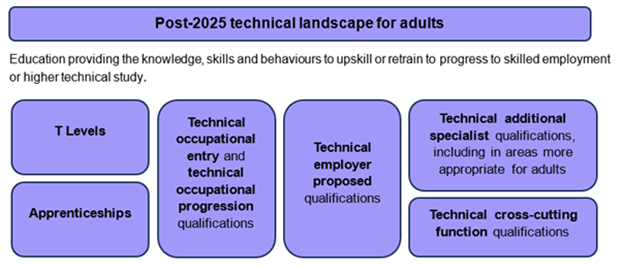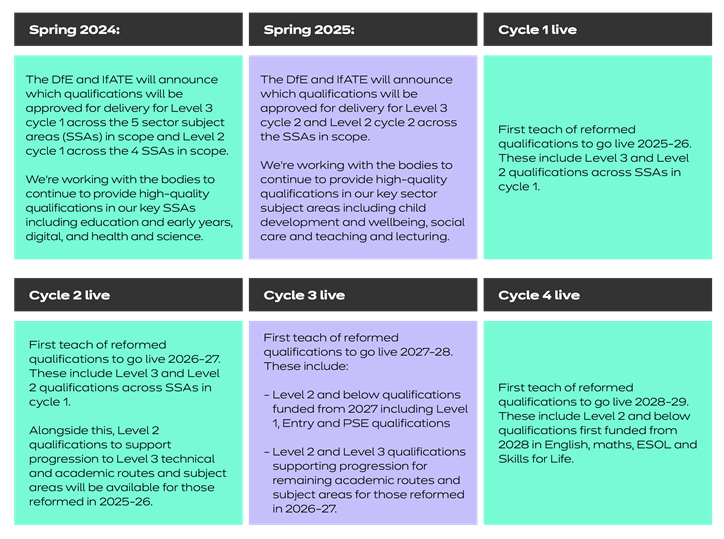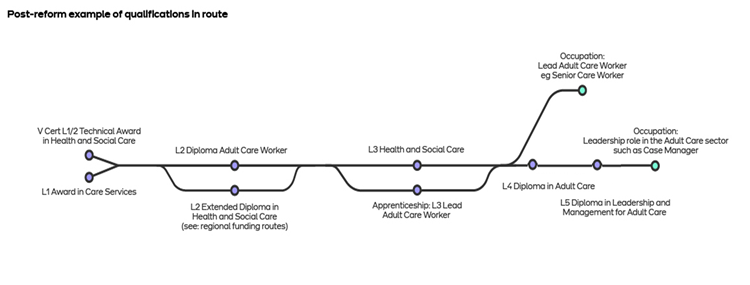What do the post-16 reforms mean for adult learners?
Background to the reforms
The momentum for change came about after successive reviews (Wolf, 2011; Sainsbury, 2016) identified a need to simplify the post-16 education system at Level 3 and below. A focus of the change was that the training learners undertake should fit the needs of the workplace which they intend to progress into, with employer input being a keystone in the process.
Technical or academic?
After the Skills Act (2022) passed, IfATE took on a more central role in overseeing the technical education system and the Department for Education (DfE) leading on the alternative academic offering.
In the new landscape, qualifications have a clear demarcation between the academic (AAQ) and the technical (TQ) as post-16 qualifications move towards meeting the new criteria set of being, “necessary, high quality and having a clear purpose.”

Technical vs academic qualifications
What does this mean for adult learners?
For both 16–19-year-old and adult learners in the technical landscape, apprenticeships will continue to be available which, alongside the new reform categories, support progression to skilled employment or higher technical study.
Within the academic landscape, supporting progression onto further and higher education, A Levels will remain unchanged for both 16-19 and adult learners. The newly introduced Alternative Academic Qualifications (AAQs) will provide an option to undertake qualifications alongside or as an alternative to A Levels for both 16-19 learners and adults.
For 16–19-year-old learners this will mean that in this new technical landscape, T Levels will be the main qualification of choice. Other categories of reformed qualification, technical occupational entry and progression, will be offered by those areas not served by T Levels. There will also be additional categories offering specialist learning or meeting a cross-cutting function across sector areas.
For adult learners, a small pilot is currently ongoing as to whether T Levels specifically for adults are an option to be rolled out. These would primarily benefit an adult market without a first full Level 3 qualification. In the new technical landscape, occupational entry and progression qualifications are expected to provide the widest offering for adults. For adults, these qualifications will differ in the 16-19 market in that qualifications may be produced that cover T Level content.
Additional categories offering specialist learning or meeting a cross-cutting function across sector areas will be available only to adults. However, unlike for younger learners, additional categories including employer-proposed, will be available. This greater intended flexibility reflects a need for a wider diversity of skills required and across more specific as well as wide-ranging areas for adult learners.
The Big Picture: Academic and technical in the post-2025 landscape for adults
The following information comes from the DfE guide on the post-16 landscape and is subject to updates as the reform process rolls out:


Academic and technical in the post-2025 landscape for adults
When will the changes come about?
The reforms are broken down into four cycles to reflect the time required for awarding organisations, providers and also learners to understand and prepare for the coming changes. Removal of funding for qualifications that don’t meet the new criteria will begin in 2025 for adult learners as the new, funded qualifications are introduced.
These cycles can be summarised from the manuals and timeline guidance from the DfE and IfATE as follows:

Reform cycle information
What will this look like for learners?
Case study example by learner:
A 25-year-old learner in the role of Early Years Practitioner is looking to develop further in their career now that they have a few years of experience and already hold the minimum entry qualifications
Potential route considerations:
- Additional Specialist qualification – e.g. Level 3 Nutrition in Early Years
- A new Level 4 qualification to upskill – e.g. Early Years Emotional Wellbeing
- CPD short courses including Leadership or within her subject specialism. This may be regionally funded – e.g. Diploma in Management Skills and Knowledge.
Case study example by sector route:
Sector area: Care services
Aligned to Occupational Route: Lead Adult Care Worker
Description: A vital frontline role supporting vulnerable adults with care and support needs at home, in care centres, residential and nursing and other healthcare settings.
The following route map shows an example of progression and qualification options currently and following the new reform structure (provisional). While some qualifications will remain the same, others will be replaced with a new qualification in a similar space.
We also feel it is important to mention that our qualifications will also remain past 2025-26 where alternative funding sources identify a need for these, primarily through regional funding routes where devolved mayoral combined authorities continue to identify and fund key areas as a need.

Current example of qualification in route

Post-reform example of qualification in route
What is NCFE doing to respond and adapt to the reform process?
NCFE is the UK’s third largest technical and vocational awarding organisation, celebrating our 175th year in education in 2023. Supporting learning across a wide range of sector areas from teaching and learning to childcare and digital, we are committed to ensuring no learner is left behind.
We’re the leading awarding organisation in the UK for funded adult training and are working within the scope of the changes brought about by reform to continue our high-quality provision in the subject areas which we are known for. We’re also using our expertise to strengthen support in others. Our Learning for Work team has been involved in shaping our reform offering to meet the needs of adult learners and we look forward to offering our newly developed qualifications from 2025-26.
Through external engagement, we’ve also been involving employers and external stakeholders every step of the way to make sure their valuable input is used in our developments.
Employers and the workforce: Collaborating with NCFE
NCFE is committed to working closely with subject sectors and seeking the valuable involvement of employers to ensure all new qualifications through the post-16 qualification reforms meet the needs of the workforce, providers and students.
We’re proud to share the experiences of some of these key stakeholders and would like to thank everyone who has been involved in consultations, development, review, letters of support or other collaboration with us so far.
“I strongly support the Level 2 and 3 qualification reform project as it provides a much-needed opportunity for individuals who want to get involved in our sector to acquire practical skills and knowledge through apprenticeships. This reform will have a significant impact on learners, enabling them to receive a well-rounded education that is both practical and theoretical.”
- George Osei-Oppong Junior (CEO, Host Help)
“I have been involved in a volunteer capacity as an advisor and in helping with some validation exercises. I believe that these qualifications have great potential to help learners in the future.”
- Dr Young (Medical Educator, London)
How can I get involved?
We welcome input from all educators, employers or other stakeholders keen to be involved in shaping the reform process with NCFE – your support would be invaluable. You can express an interest in collaboration here.
I would say that being part of the reforms keeps the sector at the heart of your developments and the content of your programmes. It shows your forward-thinking approach is being sector-led and demonstrates how high-quality training and development is key to high-quality practice.
Download our free reform guide and access FAQs
Find out more
DfE review of post-16 qualifications at Level 3 in England: what you need to know
The Level 3 review represents a significant change in post-16 education policy, says our Product Manager of Technical Education, David Rowley. Here, he breaks down the key takeaways.

Pilot using VR in assessment finds positive impact on student performance
A study by The Sheffield College has found that using Virtual Reality (VR) in assessments had a positive impact on student performance and in retaining information.

Preparing for success: transforming the Functional Skills experience for learners
Vicki Dobney, Teacher and Project Manager at Runway Training, reflects on the challenges of maintaining effective teaching practices while balancing heavy workloads and introduces an innovative solution.


